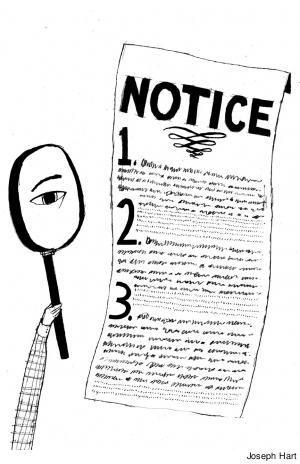Knowing your rights is a priority when facing a denial of reappointment decision. One of the most important rights you have under the PSC/CUNY contract is the right to challenge a denial of reappointment.

The time is approaching when many members of the instructional staff are due to be notified of reappointment or non-reappointment for the 2015-2016 academic year. On or before December 1, 2014, CUNY colleges have a contractual obligation to notify all those in tenure-bearing titles and certificate-bearing titles who are in their second or more year of service about their reappointment or non-reappointment. This applies to full-time faculty, Instructors, and those in the College Lab Technicians series.
Reappointment Notice
For Lecturers, notice of reappointment or non-reappointment must be received no later than April 1, 2015, in the second year of service, and on or before December 1 in the third year and beyond. For Higher Education series titles who are being considered for their first or second reappointment notification, the deadline is also April 1, and for those being considered for their third or more reappointment, it is March 1.
Adjuncts who were hired solely for the Fall 2014 semester must also be notified no later than December 1, 2014, about whether they are being appointed for the Spring 2015 semester. For those adjuncts who are eligible for a yearly appointment, notice must be provided on or before May 15. Unlike full-time members of the instructional staff, adjuncts do not have the same contractual right to presidential reasons when non-reappointed. However, they retain the contractual right to grieve a denial of reappointment and lack of timely notice. Adjuncts who do not receive the required notice should promptly call the PSC office and report it to an adjunct grievance counselor.
Right to an Academic Appeal and Presidential Reasons
It’s important to be familiar with the timeframe for challenging a negative decision, and you should know what actions to take if you are notified that you have been denied reappointment.
All full-time titles have the right to an academic appeal through their college’s local appeals procedure. Because the appeals process varies from campus to campus, contact your chapter grievance counselor or your chapter chair for details. (For a list of chapter grievance counselors, click here.)
If no academic appeals procedure exists at your college, or where such procedures do not culminate in an appeal to the college president, full-time instructional staff have the contractual right to appeal a negative decision directly to the president. Should the appeal be denied, faculty and some instructional staff have the right to request and receive a written statement of the reasons for the denial from the college president.
Article 9 of the contract specifies that you have 10 calendar days (excluding Saturdays, Sundays and legal holidays) from the date of receipt of the president’s rejection of your appeal to submit to the president a signed request for a statement of reasons. Within ten calendar days (excluding Saturdays, Sundays and legal holidays) after receiving your request, the president must provide you with a written statement of reasons.
Right to Grieve a Denial of Reappointment
Upon receiving notice of non-reappointment (or if you do not receive the required notice) you should immediately contact a grievance counselor if you may want to challenge the decision, so that a grievance could be filed within the specified time limits. This is of critical importance.
Under the terms of our contract, a grievance relating to reappointment must be filed within 30 days, excluding Saturdays, Sundays and legal holidays, of your individual scheduled date of notification. You may contact your local campus grievance counselor or one at the PSC central office upon receiving a notice of denial of reappointment.
Grievances challenging a decision of non-reappointment for full-timers will be held in abeyance until after the academic appeal process is complete and, if the appeal has been denied, a statement of reasons from the president has been requested and received. However, the grievance must nonetheless be filed within the relevant time limits.
Once you have received the president’s statement of reasons, notify your grievance counselor. The counselor will meet with you, and after assessing your employment history, the presidential reasons letter, your personnel file and other materials and facts, will determine whether there is a contractual basis to pursue a grievance on your behalf. All notification contractual dates and deadlines for grievances for all job titles can be found here.
Due Process
The contract recognizes the role of academic judgment, and that the president has a duty to support the appointment, reappointment and tenure of only those persons who he/she is reasonably certain will contribute to the improvement of academic excellence. But due process must be followed: a grievance may be pursued if the decision was in violation of the agreement or was not made in accordance with the Bylaws or written policies of the Board of Trustees, or if it constituted an arbitrary or discriminatory application of Bylaws or written Board policies.
Your rights in this area of the contract are set forth in Article 9, Article 10, Article 13, and Article 20 and it is worth taking the time to review these provisions.
In order to defend your rights, you first need to know what they are.

